DISCUSSION PAPER No 2/2021: A MULTIJURISDICTIONAL ANALYSIS OF DATA-DRIVEN MERGERS: CURRENT ASSESSMENT AND PUBLIC POLICY PROPOSALS FOR BRAZIL
Data Privacy Brazil Research in partnership with the Brazilian Institute for Consumer Protection (Idec) launches a seven month study about data-driven mergers led by the researcher Lucas Griebeler Motta (University of Chicago).
Data Privacy Brazil Research in partnership with the Brazilian Institute for Consumer Protection (Idec) launches a seven month study about data-driven mergers led by the researcher Lucas Griebeler Motta (University of Chicago).
The paper, “A Multijurisdictional Analysis of Data-Driven Mergers: current assessment and public policy proposals for Brazil”, addresses the hot topic of data-driven mergers in the technology market (acquisitions that expand the acquiring company’s ability to collect and process personal data that was not available before the acquisition) and presents recommendations for the performance of public authorities in Brazil.
Based on the premise that the level of privacy offered to the user is a non-price competition dimension that must be considered, the researcher examined five paradigmatic antitrust cases investigated by foreing authorities – Facebook/Instagram (2012), Google/Waze (2013), Facebook/WhatsApp (2014), Apple/Shazam (2018) and Google/Fitbit (2020, 2021). The understanding of the decision-making process used in these cases allowed the researcher to identify deficiencies in their analysis, which were not intended to suggest that the merger decisions should have had different outcomes, but to map the main challenges and extract lessons for future cases.
Although all companies involved in the studied cases operate in Brazil, due to the current Brazilian merger control rules, none of these cases were notified to the Administrative Council for Economic Defense (“CADE”), demonstrating how the current merger control regime provided by Law No. 12,529/2011 is insufficient to “capture” potentially sensitive transactions in technology markets. The study also demonstrates that, even if CADE had investigated the mergers examined in this report, CADE’s assessment would have been incomplete. “For antitrust authorities, assessing a merger is an exercise of predicting the future, which is subject to methodological errors and substantial changes in market conditions, especially when it comes to technology markets”, claims the study.
Oriented by these findings, the author suggests institutional and legislative improvements to better reflect the current competitive dynamics and close legal loopholes in Brazil. The establishment of new merger control criteria for Brazil, the creation of a new Merger Control Unit within CADE specialized in the technology sector and a better technical cooperation with Brazilian National Data Protection Authority (“ANPD”) are some of the suggestions. The paper recommends procedural improvements in CADE, such as the creation of a website containing all relevant data concerning merger cases that are under review, the creation of more rights to intervene and petition to the benefit of third parties (such as non-governmental organizations), the inclusion of a specific section in the templates of merger forms about the acquisition and consolidation of databases and the release to the public of materials produced in the context of international cooperation.
The study is part of the project “Discussion Papers” launched by Data Privacy Brasil in 2021, which aims to inspire cutting-edge discussions about data protection and privacy. “Lucas Griebeler’s research is important because it shows that procedural reforms can be made and that organized civil society can be more involved in data-centric mergers and acquisitions. We hope it can illuminate discussions not only in Brazil but worldwide”, said Rafael Zanatta, executive director of Data Privacy Brazil Research.
Veja também
-
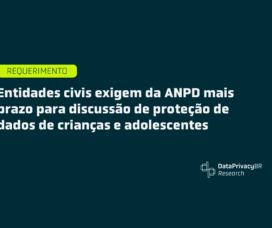
Entidades civis exigem da ANPD mais prazo para discussão de proteção de dados de crianças e adolescentes
Dada a importância do tema e a necessidade de um prazo maior para análise, compreensão e produção de contribuições, diversas entidades assinaram uma Carta Aberta solicitando à ANPD a ampliação do prazo por mais 30 dias.
-

Plataforma de inteligência artificial usa imagens de crianças brasileiras sem autorização
Reportagem do Jornal nacional aborda como uma plataforma de inteligência artificial na Alemanha está usando imagens de crianças brasileiras sem autorização. Rafael Zanatta, codiretor da Data Privacy Brasil fala sobre as principais preocupações relacionadas ao tema.
-

IA na sala de aula: Construindo modelos participativos para a comunidade escolar
Como a comunidade escolar pode participar da governança das tecnologias de ensino-aprendizagem? Para responder a esta questão, lançamos a cartilha “Inteligência Artificial na Sala de Aula: modelos de participação para a comunidade escolar”.
-

IAs nas eleições: ‘socializar e compartilhar não apenas os benefícios mas também os riscos’
O TSE deve votar hoje as regras para as eleições municipais. Bruno Bioni, diretor do Data Privacy Brasil, fala sobre resolução que deve disciplinar uso de tecnologias de inteligência artificial nas campanhas.
-

Data Privacy Brasil demanda esforços públicos e privados nas eleições de 2024 diante das IAs
A Data Privacy Brasil vem a público elogiar a aprovação de novas regras para eleições de 2024 pelo Tribunal Superior Eleitoral (TSE) na noite de 27 de fevereiro, sob relatoria da vice-presidente da corte eleitoral, ministra Cármen Lúcia, bem como manifestar preocupações com relação aos potenciais usos abusivos de tecnologias da informação nas eleições deste ano.
-
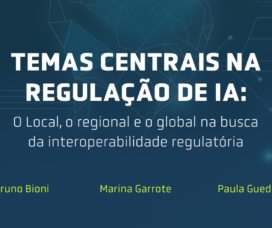
Temas Centrais na Regulação de IA: o local, regional e o global na busca da interoperabilidade regulatória
A Data Privacy Brasil anuncia o lançamento de seu position paper sobre temas centrais na regulação local, regional e global de inteligência artificial. O documento traz os principais pontos de convergência entre mais de 20 fontes normativas, sem deixar de considerar as particularidades necessárias para o contexto brasileiro.
-

Confundida com criminosa por ‘Inteligência Artificial’ denuncia racismo: “Discriminada por ser pobre e preta”
Um erro da IA (Inteligência Artificial) usada no reconhecimento facial das câmeras de um evento em Aracaju (SE), motivou a abordagem. Ela conta que, meia hora após chegar à micareta, três agentes à paisana da PM a interceptaram. Perguntaram o nome dela e pediram o documento. Como ela estava sem o RG, o constrangimento iniciou.
-

EUA adotam novas diretrizes para IA
Na última segunda (30/10), o presidente dos Estados Unidos, Joe Biden assinou um decreto sobre inteligência artificial, o qual busca equilibrar as necessidades de empresas de tecnologia de ponta com a segurança nacional e os direitos dos consumidores. O governo estadunidense almeja estabelecer um conjunto de proteções que possam ser fortalecidas por legislações e acordos globais. Mas quais disposições são essas? Vamos conferir!
Veja Também
-

Entidades civis exigem da ANPD mais prazo para discussão de proteção de dados de crianças e adolescentes
Dada a importância do tema e a necessidade de um prazo maior para análise, compreensão e produção de contribuições, diversas entidades assinaram uma Carta Aberta solicitando à ANPD a ampliação do prazo por mais 30 dias.
-

IA na sala de aula: Construindo modelos participativos para a comunidade escolar
Como a comunidade escolar pode participar da governança das tecnologias de ensino-aprendizagem? Para responder a esta questão, lançamos a cartilha “Inteligência Artificial na Sala de Aula: modelos de participação para a comunidade escolar”.
-

IAs nas eleições: ‘socializar e compartilhar não apenas os benefícios mas também os riscos’
O TSE deve votar hoje as regras para as eleições municipais. Bruno Bioni, diretor do Data Privacy Brasil, fala sobre resolução que deve disciplinar uso de tecnologias de inteligência artificial nas campanhas.
-

Data Privacy Brasil demanda esforços públicos e privados nas eleições de 2024 diante das IAs
A Data Privacy Brasil vem a público elogiar a aprovação de novas regras para eleições de 2024 pelo Tribunal Superior Eleitoral (TSE) na noite de 27 de fevereiro, sob relatoria da vice-presidente da corte eleitoral, ministra Cármen Lúcia, bem como manifestar preocupações com relação aos potenciais usos abusivos de tecnologias da informação nas eleições deste ano.
-

Temas Centrais na Regulação de IA: o local, regional e o global na busca da interoperabilidade regulatória
A Data Privacy Brasil anuncia o lançamento de seu position paper sobre temas centrais na regulação local, regional e global de inteligência artificial. O documento traz os principais pontos de convergência entre mais de 20 fontes normativas, sem deixar de considerar as particularidades necessárias para o contexto brasileiro.
-

Confundida com criminosa por ‘Inteligência Artificial’ denuncia racismo: “Discriminada por ser pobre e preta”
Um erro da IA (Inteligência Artificial) usada no reconhecimento facial das câmeras de um evento em Aracaju (SE), motivou a abordagem. Ela conta que, meia hora após chegar à micareta, três agentes à paisana da PM a interceptaram. Perguntaram o nome dela e pediram o documento. Como ela estava sem o RG, o constrangimento iniciou.
-

EUA adotam novas diretrizes para IA
Na última segunda (30/10), o presidente dos Estados Unidos, Joe Biden assinou um decreto sobre inteligência artificial, o qual busca equilibrar as necessidades de empresas de tecnologia de ponta com a segurança nacional e os direitos dos consumidores. O governo estadunidense almeja estabelecer um conjunto de proteções que possam ser fortalecidas por legislações e acordos globais. Mas quais disposições são essas? Vamos conferir!
-
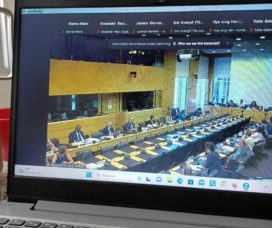
Data Privacy Brasil participates in UN’s OHCHR briefing on Brazil
The organization highlighted how the advance of edtech has been violating children’s privacy in the country
-

Privacidade e Proteção de Dados: Uma abordagem dos direitos das crianças para a criptografia
Há quem entenda que a garantia do anonimato pela criptografia e a proteção de crianças na internet são coisas separadas, até mesmo opostas. Porém, novo relatório propõe uma olhar mais complexo e multissetorial para a questão.
-

Associação Data Privacy Brasil de Pesquisa participa da Reunião Ministerial da OCDE sobre economia digital
Evento teve como principal tema de debate os caminhos para um futuro inclusivo no ambiente virtual
-
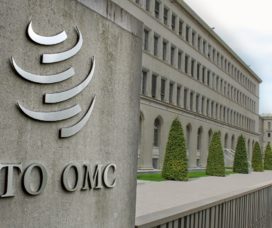
Organização Mundial do Comércio realiza a sua 12ª Conferência Ministerial
A cobertura do evento, dedicado a acordos e negociações envolvendo comércio internacional, foi acompanhada pela Associação Data Privacy Brasil de Pesquisa.
-

Associação Data Privacy Brasil de Pesquisa participa do painel “Proteção de criança online na pandemia: ferramentas e boas práticas para um ambiente seguro”
Workshop, que faz parte das atividades do 12 Fórum da Internet no Brasil, buscou apresentar e debater o surgimento de novas ferramentas para conter as ameaças que crianças e adolescentes encontram ao utilizarem a internet
-

The regulation of digital platforms is already a reality
The Digital Markets Act is about to be approved in the European Union and is expected to impact other jurisdictions
-
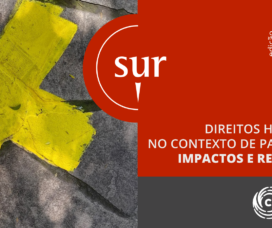
Conectas e Data Privacy Brasil lançam a 31° edição da Revista Sur
Publicação proporciona debates a respeito dos impactos da pandemia sobre os direitos coletivos e liberdades individuais no Sul Global
-

A regulação de plataformas digitais já é realidade
O Digital Markets Act está para ser aprovado na União Europeia e deve impactar outras jurisdições
-

A proteção legal dos dados pessoais de crianças e adolescentes no Brasil
Discussões sobre a proteção de dados de crianças e adolescentes ao longo do processo de discussão da LGPD no Executivo e Legislativo, buscando entender como chegou-se ao atual art. 14 da lei.
-

TikTok e o “caso Antonella” na Itália
Uma menina de 10 anos chamada Antonella foi ao banheiro da sua residência, sozinha, levando seu celular, para realizar um desafio denominado blackout challenge no aplicativo TikTok. O desafio consistia em tentar ficar sem respirar o máximo possível. Para tanto, ela colocou uma faixa ao redor do pescoço, o que gerou um desmaio, seguido de um coma. […]
DataPrivacyBr Research | Conteúdo sob licenciamento CC BY-SA 4.0

